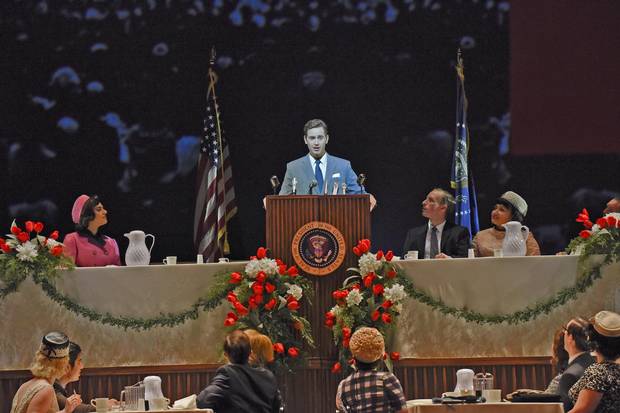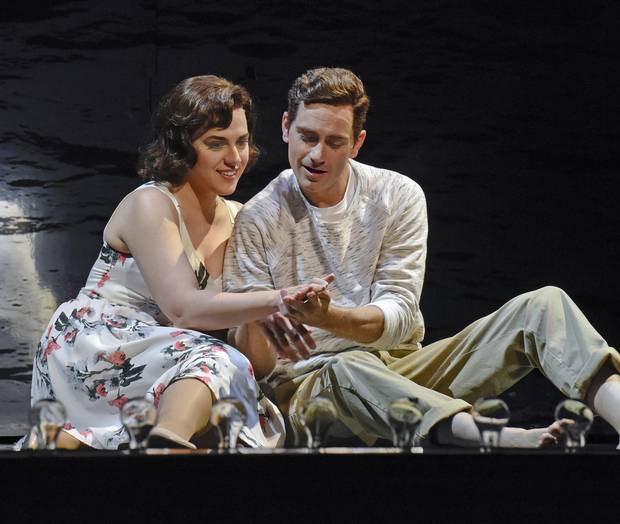It was nearly midnight on the last night of his life when John F. Kennedy arrived at the Hotel Texas in Fort Worth. After greeting the crowd outside, the president and his wife, Jackie, exhausted by a full day of activities in San Antonio and Houston, ordered coffee and went to bed.
Kennedy's last bedtime may not seem like a promising scenario for an opera, compared with the fatal drama of Dallas the next day. But the president's final goodnight became a grand psychological playground for David T. Little and Royce Vavrek, composer and librettist, respectively, of JFK, a new opera that opens Saturday at Place des Arts.
"It's difficult to do much when your protagonist is sleeping most of the time," the Canadian-born Vavrek said in a phone interview from Washington. "We needed to delve into his nocturnal rhythms and his dreamscape."
No records exist of whether or what Kennedy may have dreamt that night, so the way was open for Vavrek and Little to create a fictional dream world based on the couple's known preoccupations and recent experiences.
"We wanted the dreams to be big and colourful and vivid, because they reveal a lot about the psychology of the characters," Vavrek said.
Another factor, drawn from real life, helped amp up the dream scenes. Kennedy was taking drugs for chronic back pain. In an early scene, Jackie injects him with morphine while he eases his torment in a bathtub. She also takes a hit herself, to dull the psychic pain of having lost her infant son Patrick three months earlier.
Moments later, Jack is flying to the moon with his sister Rosemary, lost not to death, but to mental illness and a lobotomy. The moon looks a lot like the beach at Hyannis Port, where Jack and Jackie, in another dream sequence, relive a plausible first meeting.
Russian leader Nikita Khrushchev is also on the moon, as he hoped his country would be during the accelerating space race, and later appears near Jack's bathtub. The real-life president's final speech, the next morning at a breakfast meeting, was about military security – another reason his Russian opponent might invade his dreams.
In the opera's most unihibited dream scene, vice-president Lyndon Johnson barges into the presidential bathroom with five other Texas politicians. LBJ swaggers and taunts Kennedy, who was seen by many at the time as a less-wily political operator than his running mate.
The over-the-top depiction of several native sons got people's attention when JFK premiered in Fort Worth last year, but Vavrek said his Johnson is not a depiction of the real man. "It's a dream through the prism of Jack's anxieties and dreams are not subtle things," he said.
The opera's most realistic scenes are those in which Jackie sings of her emptiness after the death of her son. The loss is presented as a tragic bridge toward a new closeness for the presidential couple, something that was noted in real life by presidential press secretary Pierre Salinger.
"The haze of grief is something that a lot of my work deals with," Vavrek said. "I lost my father almost 10 years ago, when I was 25, and it was a giant lightning bolt in my life. I think about that a lot, and about how it colours our experiences."

Opéra de Montréal has not been shy about positioning the opera to make a statement about the current administration in Washington
Vavrek grew up on a farm near Grande Prairie, Alta., leaving at the age of 18 for studies in Montreal and New York. His father, Andy, was a farmer, "and very much a cowboy. He and my mom would ride the flags around for the rodeos. He was a big, boisterous, happy man, with a lot of energy and lots of friends."
The librettist saw a bit of his father in LBJ, another glad-handing, larger-than-life figure from a land of farms and ranches. "Lyndon reminded me of my dad to a certain extent," he said. "I love Lyndon. He's so theatrical."
The LBJ scene in the opera is "a bit sinister," Vavrek said. Little's solidly tonal music veers toward country and western, "but there's a drone underneath that has a very strange quality."
Another sinister detail is LBJ's exultant "Two shots!" remark, after killing Khrushchev in the bathroom, to which the chorus of Texas politicians respond, "Always two shots!" Kennedy, of course, was hit by two bullets in Dallas.
"We didn't want to embrace or suggest any conspiracy theories," Vavrek said, although Johnson has certainly figured in a few. The writing team was very open, however, to another kind of occult force with the power to guide events. Their opera opens with a dialogue between two of the classical Fates. Like the Norns at the start of Wagner's Gotterdammerung, JFK's fates – who double as a chamber maid and Secret Service man – muse on destiny and the fixed term of our lives.
"We thought about fate as a cosmic conspiracy," Vavrek said. "I think that really elevated the work."
Prior to Kennedy's arrival in Fort Worth, two Texas art patrons arranged to have 16 works of art placed in their suite at the Hotel Texas, including paintings by Van Gogh and Thomas Eakins, and sculptures by Picasso and Henry Moore. Kennedy slept under Van Gogh's 1887 canvas, Outskirts of Paris: Road with Peasant Shouldering a Spade.
This private art show, which the Kennedys were too tired to enjoy till the morning, was reassembled by two Texas art galleries in 2013 for the 50th anniversary of the assassination. The art also found its way into the opera.
"Those paintings and sculptures become portals into the dreams," Vavrek said. Horseback riders in a Charles Marion Russell western painting, for instance, morph into LBJ and his posse of politicos, "in full Texas regalia," as the libretto says.

JFK’s final goodnight is a grand psychological playground for David T. Little and Royce Vavrek, composer and librettist, respectively.
JFK was commissioned by Fort Worth Opera, specifically to reflect on Kennedy's last night in the city. The commission was joined by American Lyric Theatre and Opéra de Montréal. Vavrek said he was asked not to end the opera in Dallas and insists that JFK is not a political piece. "It focuses on the romance between Jack and Jackie above all else, though it's impossible to get away from the mythology of the man."
Opéra de Montréal, however, has not been shy about positioning the opera to make a statement about the current administration in Washington. A large ad for the opera in Le Devoir on the weekend said: "JFK wanted to tear down walls, not build them. JFK considered America a 'nation of immigrants, without regard for their places of origin … Haiti and other countries are not worth less than any other nation." For every regular ticket purchase, the ad says, five dollars will be donated to Kanpe.org, a Haitian relief organization co-founded by Arcade Fire's Régine Chassagne and Quebec deputy premier Dominique Anglade.
What Kennedy might have made of the present United States is anyone's guess. Behind its vivid dreamscapes, the opera bearing his initials invites everyone to dream about a period when government seemed more civil, more humane and less like a dream many of us would like to wake up from.
JFK, starring Matthew Worth as Jack and Daniela Mack as Jackie, plays Montreal's Salle Wilfrid-Pelletier from Jan. 27 to Feb. 3.

